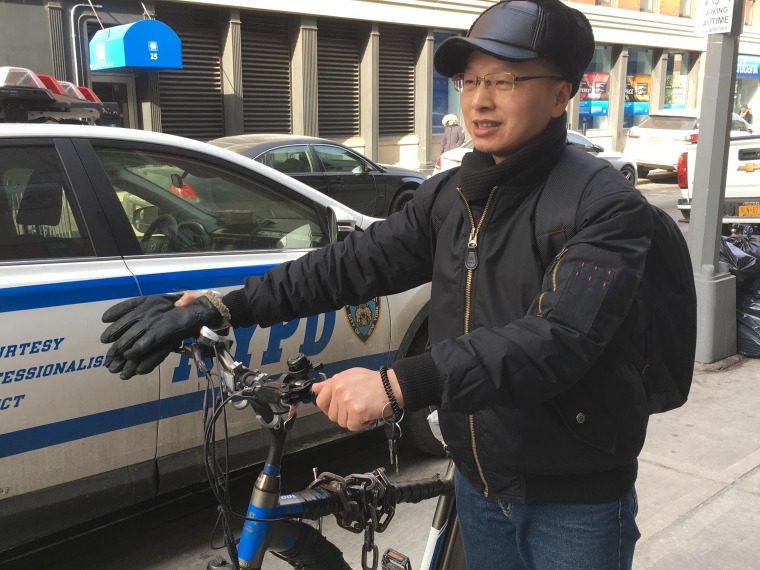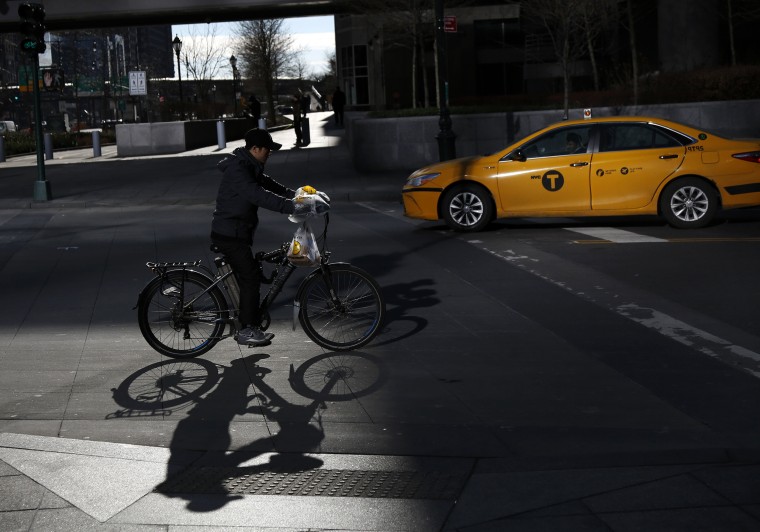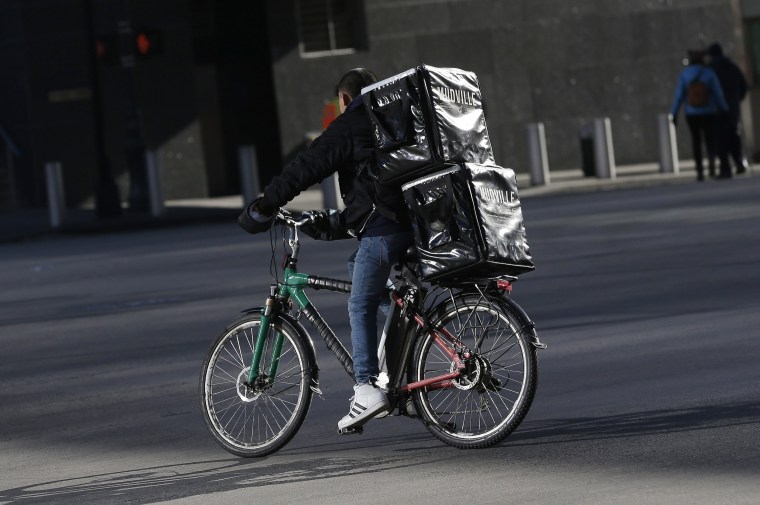Any new delivery worker will tell you his first order of business is to save for the one thing that can make life easier — an electric bike.
That’s what Liu Li Qiang did after arriving in New York City from Liaoning, China, around seven years ago. He said it could take up to two months to put away the funds needed to buy a motorized bike, some costing $1,500 or more.
“Delivery men definitely regard electric bikes as a tool for survival,” the 45-year-old Liu said, speaking in Mandarin.

E-bikes have indeed been a boon to a delivery workforce in New York City that, according to advocates, is aging, though definitive data is unavailable. With workers in their 40s, 50s and even 60s, an electric bike is seen as a smart investment as businesses expand their delivery zones, requiring delivery workers to traverse greater distances in less time, advocates say.
But there’s a hitch. E-bikes, some capable of travelling more than 20 miles per hour with a combination of human and motor power, are banned in New York City since they’re considered “motorized scooters” under the city’s administrative code.
Democratic New York City Mayor Bill de Blasio has cracked down on the bikes, which some city and state elected officials say pose a clear hazard to public safety.
Let’s say the owner of the business gets a summons. They can take it out of the worker. And then you expect the worker to go file a complaint?
But some immigrant groups and elected officials believe the city’s crackdown unfairly targets delivery workers — many of them Asian, Latino and African-American immigrants — with regulations that cut into their livelihoods.
Fines for operating e-bikes are steep — up to $500 — and the bikes themselves can be confiscated, eating into the salaries of delivery men.
“Most of these workers are paid very low wages,” said Persephone Tan, associate director of immigration and policy at the Asian American Federation, a nonprofit. “I think because they are normally folks from very vulnerable backgrounds, they would take any job that would help them sustain themselves financially.”
Starting this year, the city is slated to begin issuing civil summonses to businesses that use e-bikes or permit employees to operate them. A first offense will result in a $100 fine; each subsequent violation, $200.

Advocates worry that business owners may deduct those penalties from the wages of delivery workers, among them undocumented immigrants, and fire those who’d prefer to ride e-bikes over non-motorized ones.
That, they say, will make it even more difficult for workers to eke out a living.
“Ultimately, it’s still the delivery worker that’s going to be hurt,” said New York City Councilmember Margaret Chin, a Democrat whose Lower Manhattan district includes Chinatown.
While the federal government regulates the manufacturing and first sale of electric bikes, states decide the laws governing how they can operate, according to the National Conference of State Legislatures.
The rules can be confusing. California, for instance, designates three classes of e-bikes, based on the motorized assistance they provide, and regulates them as bicycles, according to PeopleForBikes, a national bicycling advocacy group.
Most of these workers are paid very low wages. I think because they are normally folks from very vulnerable backgrounds, they would take any job that would help them sustain themselves financially.
Michigan, by contrast, defines an e-bike as a “moped,” provided its maximum speed is 30 miles per hour. Riders must carry an operator’s license, and the bikes are subject to registration requirements.
New York was identified by PeopleForBikes as one of nearly two dozen states with what it calls “problematic” e-bike regulations.
Because electric bikes in New York are considered motor-driven bicycles, they are technically subject to the registration, licensing and insurance requirement of motor vehicles, according to the group. But the New York State Department of Motor Vehicles does not allow “motor-assisted bikes” to be registered.
Thus, e-bikes are illegal to operate on New York state sidewalks, streets or highways.
Chin, whose district is no stranger to e-bikes, said the solution is for New York state to legalize them.
“If we legalize them, then they have to have training, they have insurance, they have a license, and this way it’s easier for us to make them accountable,” she said.
A resolution was introduced in the City Council in 2014 calling on the state legislature to pass, and the governor to sign, a bill to amend state vehicle and traffic law. The change would’ve included “electric assisted” bikes in the definition of bicycles, thus permitting their use, the resolution said.
New York state considered, though did not enact, e-bike related legislation in 2015 and 2016, according to the National Conference of State Legislatures.
Liu said he’s received summonses, has gone to court, and has had his e-bike confiscated twice. Retrieving it required venturing into a far-flung part of the borough of Brooklyn, a process he said could take three to four days. Financial losses, Liu added, could amount to around $1,000 each time.
A green-card holder, Liu works six days a week, 12 hours a day, relying primarily on tips. He said he sends part of his earnings home to family in China, money that helps pay medical expenses for his ailing mother.
Liu seldom takes off, even when he’s ill.
“If I don’t make deliveries, then I might not have an income,” he said. “If I don’t have an income, then what do I do about my rent? My expenses?”
Stories of hardship like Liu’s notwithstanding, some still regard e-bikes as a hazard. Complaints, sometimes lodged with local elected officials and the city, include delivery men on e-bikes driving on sidewalks, running red lights or heading the wrong way down a one-way street.

The New York Police Department in an email said that as of Dec. 3, it had confiscated 994 e-bikes and issued 514 moving summonses and 892 Environmental Control Board summonses in 2017.
The mayor’s office did not respond to a request for comment for this article. But in an Oct. 19 news release announcing the new e-bike enforcement measures, it reported a more than 170 percent increase in the number of e-bikes confiscated up to that point in 2017, compared to the same time in 2016.
It also said nearly 1,800 civil and moving summonses had been issued to e-bike operators year-to-date.
“E-bikes are illegal to operate in New York City and the NYPD is stepping up enforcement,” de Blasio said in a statement at the time. “Those at the top of the food chain need to be held accountable. That’s why instead of merely targeting riders, we’re going after businesses that look the other way and leave their workers to shoulder the fine.”
But Chin, the city councilwoman, worries how this will play out.
“Let’s say the owner of the business gets a summons,” she said. “They can take it out of the worker. And then you expect the worker to go file a complaint? I mean, ideally, yeah, that should be the case, but in reality it doesn’t happen that way.”
“At the end, the workers still get penalized,” Chin added.
Delivery men definitely regard electric bikes as a tool for survival.
Lately, delivery workers in New York City have grown more vocal, staging a rally on the steps of City Hall in December, held in part by the Asian American Federation, The Biking Public Project and Transportation Alternatives.
Tan, of the Asian American Federation, said a meeting was held on e-bike enforcement in late October with City Hall, attended by Chinese delivery workers and council member staffers. She added that they’d like the city to work with e-bike delivery cyclists and other agencies to determine best practices for delivering in the streets safely.
Liu said delivery workers want police to stop issuing fines and seizing their bikes. He also said they support legalizing e-bikes, calling it “a good strategy.” That includes measures like passing a licensing test, carrying insurance, and sending operators for training in traffic regulations.
“The question of safety does not affect just city residents or only garner the attention of officials,” Liu said. “Delivery men themselves are very much concerned about this as well.”
“The safety of one person,” he added, “holds together the safety of everyone.”
Follow NBC Asian America on Facebook, Twitter, Instagram and Tumblr.